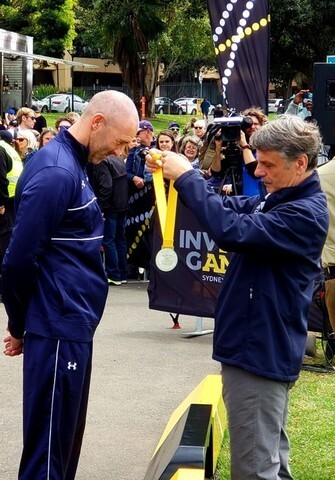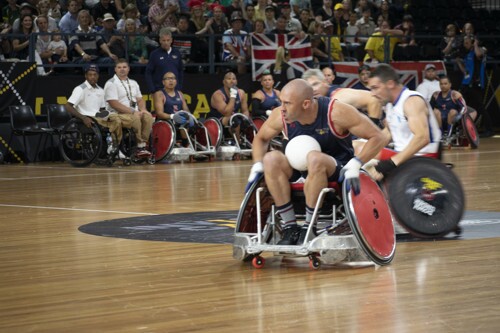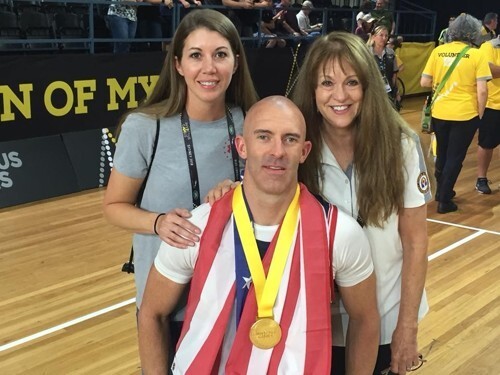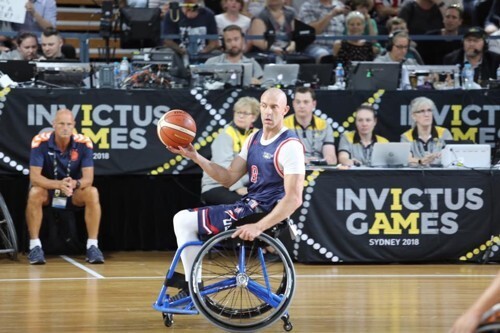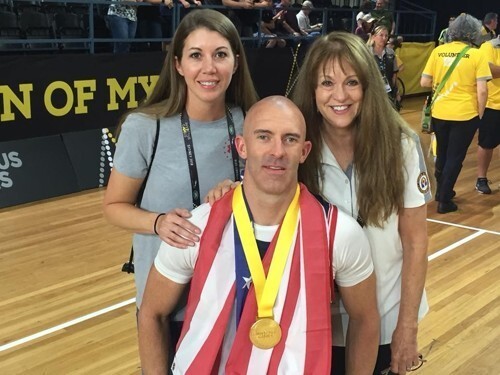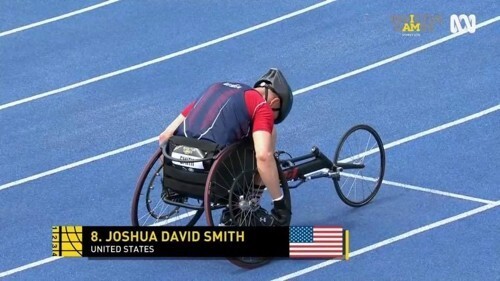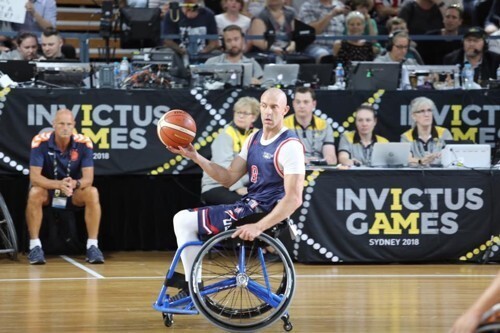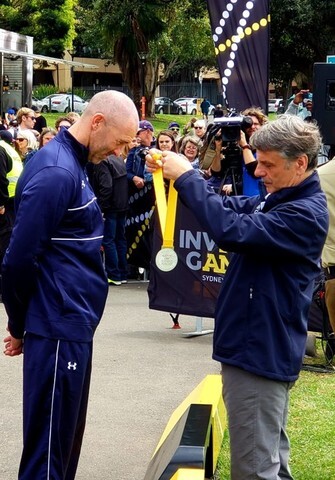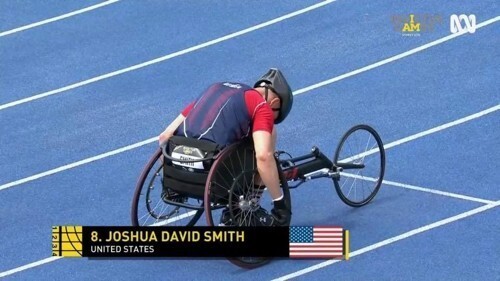It's not a place Joshua Smith ever expected to be.
The Spanish Fork resident was sitting in a wheelchair, an American flag draped around his shoulders, as Meghan Markle, the Duchess of Sussex, presented him with a gold medal at the 2018 Invictus Games in Sydney, Australia.
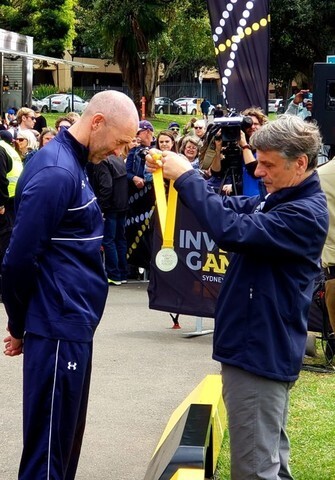
"Smitty," as his friends call him, was also personally congratulated by Prince Harry for his performance in the gold medal wheelchair basketball game.
The gold medal was one of eight total medals retired Tech Sgt. Smith received after competing in various adaptive sports as a member of Team USA and the Air Force's Wounded Warriors program in late October.
It's a far different experience and emotion from the severe injuries Smith suffered while participating in military survival school training more than a decade ago, drastically affecting his active lifestyle. Fortunately, the husband and father of five does not permanently need to use a wheelchair.
Smith, a member of The Church of Jesus Christ of Latter-day Saints, marveled as he reflected on his journey of pain, trial, and triumph.
"The journey and experience has been pretty awesome, pretty amazing, definitely one I never thought I would be on," Smith said. "I never imagined that I'd be participating in adaptive sports or have gone through the physical struggles and trials I went through during my military service and career. Sometimes life throws a curveball or two at you."
The Curveball
In June 2008, Smith, who aspired to a career in the military, injured his right hip during some intense training.
"My back went out on me. My neck went out on me. When I got out, I was hurting," Smith said. "I had about three or four days left of training and I kind of sucked it up. I didn't say anything to anybody because I just wanted to graduate and get out of there."
After a few years when he finally saw a hip specialist, Smith learned he needed two hip replacements — one for the hip injured during training and the other for compensating to his left side. The hip damage contributed to other injuries in his back and neck.
"Both of them were just completely destroyed," Smith said.
Along with a high level of pain, there were days when it was difficult to get dressed and go to work. Sometimes he couldn't bend down, so his wife and kids helped put on his socks and lace up his boots. Smith honestly doesn't know how he kept going.
"I just kind of sucked it up, just dealt with it," Smith said. "I went to doctors and physical therapists all the time and did whatever I could besides pop pills because I wasn't going to do that. (Pain) and living with the injury became the norm."
Smith medically retired from the military in 2016 after 13 years of active duty. He could still stand and "hobble" around but he was a shell of his former physically active, outgoing self.
Wounded Warrior
After Smith's hip replacements, a good friend mentioned having a friend in the Air Force's Wounded Warrior program and suggested Smith consider becoming involved.
Initially, Smith didn't think he qualified. To him, the Wounded Warriors were the soldiers who lost a limb in a war zone.
"That's for people who have experienced a lot more than what I've gone through," Smith said. "At first I didn't do it."
Eventually, another friend prevailed on Smith to at least learn about it. Smith and his wife, Michelle, found not only qualified, but the program also provides a number of benefits and care for disabled servicemen and women.
Smith attended a Wounded Warrior camp in Florida and rediscovered his passion for competition through adaptive sports such as wheelchair basketball, sitting volleyball, cycling, and rowing, among other athletic events.
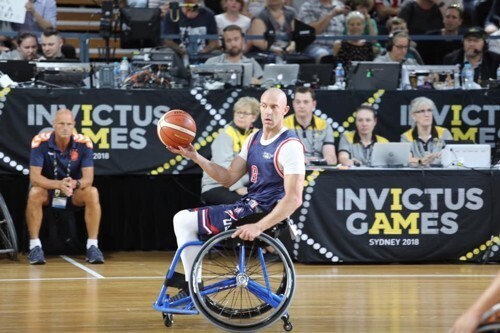
"I basically got hooked because I grew up playing sports," Smith said. "When I had my hip replacements, I had this specialist who says I can't play contact sports anymore. I had this big old list of do's and don't's because of having hip replacements. That took a lot away from me because I was such a physically fit, active person my whole life. It was difficult to not be able to do those things. Once I got involved with this first camp, I started playing adaptive sports and realized this is awesome."
The Smiths met many inspiring people at that first camp. Some were amputees who had lost limbs and suffered burns. Others battled cancer or other illnesses during their military service.
While there, the Smiths became closely acquainted with one couple. The husband, retired Air Force Capt. Austin Williamson, had cancer. Williamson's positive demeanor, attitude and personal motto impressed Smith: "Life isn't about what I can't do; it's about what I can still do."
It was a message Smith needed to hear and it gave him new perspective.
"There's still a lot of life left. There's still a lot of things that I can do," Smith said. "I can still enjoy life and have good experiences."
Invictus Games
After competing in the Department of Defense Warrior Games for the last two summers, Smith was selected for the 2018 Invictus Games, hosted in Australia.
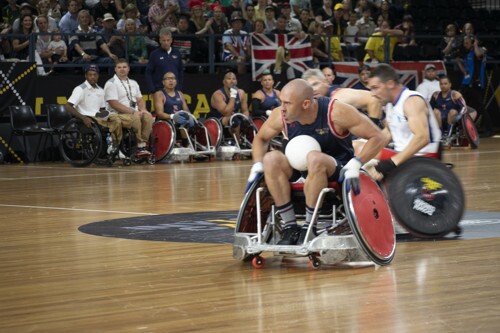
Prince Harry founded the Invictus Games in 2014 to give injured military personnel and veterans from nations around the globe the opportunity to compete in adaptive athletic events. The games use the power of sports to inspire recovery, support, rehabilitation and generate wider respect for wounded, injured or sick servicemen and women, according to the website, invictusgamesfoundation.org.
Team USA has a 72-member roster, consisting of athletes each from the Army, Marines, Navy, Coast Guard, and Air Force, Smith said.
"I was selected as one of 15 Air Force Wounded Warriors," Smith said.
Smith made the trip with his wife, Michelle, and mother, Becky Smith. In addition to bringing home the gold in wheelchair basketball, he claimed six silver medals (four in track and field chair racing and two in cycling with a recumbent bike), and one bronze in wheelchair rugby.
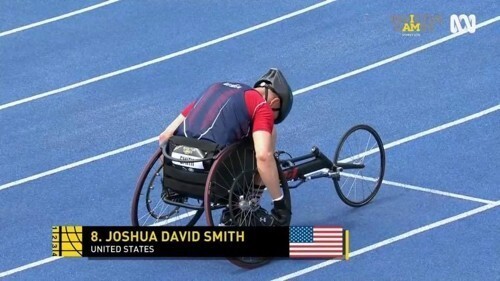
Michelle Smith said one of the highlights was seeing her husband play in the gold medal game for wheelchair basketball. When the team captain became sick and couldn't play, Smith stepped up and "had the game of a lifetime." She described the experience as "special" and expressed gratitude for what the Wounded Warrior program as given to her husband.
"Watching him compete and seeing him do what he loves is such an emotional experience. When he was told he would never play contact sports again and seeing the effects that had on him was hard. He was losing a huge part of his life, one of his biggest passions," she said. "So when he found out about adaptive sports and was told he could play again, just in a different way, it was like the spark in his eyes was back. He was so excited and felt like himself again."
While drawing on his Latter-day Saint faith for strength amid his challenges, Smith also found inspiration in the words of the poem "Invictus," by William Ernest Henly, which includes the lines, "I am the master of my fate, I am the captain of my soul."
"It helps me glimpse an eternal perspective of life," Smith said. "I can still personally be in charge of what I'm going to do with the rest of my life. ... I can still have a positive attitude, be a positive influence and use the experiences I've gone through to help, serve and be a light to others. ... There's a lot of life left."
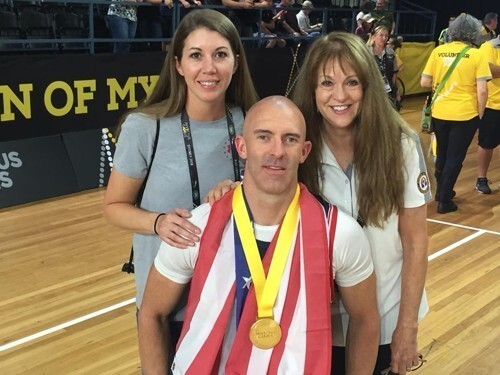
Netherlands in 2020
So what's next for Smith?
Since returning from Australia, Smith is looking for employment. Since retiring from the military in 2016, he's been a student at Utah Valley University. In August he completed a bachelor's degree in emergency services administration with an emphasis in emergency management.
"Anything that deals with emergency preparedness. It's a broad field," Smith said. "I went into administration because I kind of need a desk job."
Smith also plans to keep playing adaptive sports and hopes to qualify for the Invictus Games again in 2020, hosted by the Netherlands.
"After our experience in Australia, I definitely want to have another opportunity to be part of Team USA and compete in 2020," Smith said.
For more information on the Air Force's Wounded Warrior program, visit www.woundedarrior.af.mil.
All images courtesy of Joshua Smith
